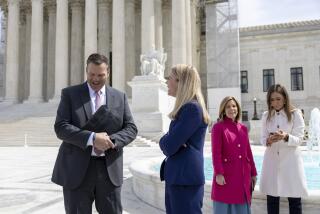COLUMN RIGHT : Court Leaves Abortion Right Undiminished : Ignore the liberal histrionics; the Rust ruling simply affirms limits on use of public funds.
- Share via
The repeated pattern of liberal histrionics regarding Supreme Court decisions touching the abortion issue will do more to undermine women’s right to choose than the most sordid anti-abortion dicta. If Roe vs. Wade is ever reversed, it will be abortion pro-choice activists that should be blamed. This is exemplified by the pro-choice response to the court’s decision last week in Rust vs. Sullivan.
Rust decided a very narrow issue; it did not limit the right to abortion. The court simply ruled that federal funding of family-planning services was intended only for that: for pregnancy prevention (and related population research, infertility services, and so on), not for services to terminate pregnancy. Nor did the funding legislation, passed by Congress and activated by federal regulations, affect physician behavior in the private sector or prohibit patients at government-funded clinics from getting abortions or abortion advice elsewhere. In fact, the projects funded by the act did not even engage in prenatal care or deliver babies; a pregnant patient had to be referred out. While the act prohibits steering such patients to clinics that primarily do abortions, it does not prohibit referral to a physician that performs abortions.
Put simply, under the funding act, a physician could get government money if he or she advanced the government’s purpose, namely preventive preconception care, but not for pursuing a political, social or medical agenda of encouraging abortion when it was not medically necessary.
Rust vs. Sullivan challenged the funding act on First and Fifth Amendment grounds. On the First Amendment issue, the court noted that the act does not prohibit any speech; it funds the speech the government likes. The majority opinion noted that the National Endowment for Democracy, established by Congress to encourage other countries to adopt democratic principles, was not constitutionally required to fund a program to encourage or even to explain competing lines of political philosophy, such as communism and fascism.
The court pointed out that under the act the government is not denying a benefit to anyone, but is instead simply insisting that public funds be spent for the purposes for which they were authorized, in this case, to provide pre-conception counseling. Just because you have a right to speak a particular idea does not mean that you can force the government to pay you to speak.
The court dispensed with the Fifth Amendment attack on the act by reiterating its prior rulings that the government is not required to fund abortion just because abortion is a fundamental right. The Constitution is an instrument designed to stop the government from interfering with individual rights; it does not require that the government subsidize those rights. As we all know, sadly, the government is not required to fund any medical care whatsoever.
The court also rejected the argument that the act places impermissible burdens on the exercise of a fundamental right, pointing out that women in funded projects may still seek abortions or abortion counseling at their own expense. The fact that poverty may reduce this likelihood is not constitutionally relevant.
In fact, the right to abortion was not reduced one iota; rather, liberals failed to persuade the court that the right to abortion should be expanded to include a right to a government subsidy. If women want such a subsidy, then they will have to ask Congress or their state legislatures, because the judicial branch of government is not empowered to make gifts of public money.
Histrionic liberals are now painting a bleak scenario of abortion rights being progressively eroded by recent Supreme Court decisions. This is worse than inaccurate; it may generate a self-fulfilling prophesy.
The advance of law is moved by scholarly thought, the evolution in doctrine, the waxing and waning popularity of certain social and political ideas and, most importantly, by an ineffable unconscious sense of the ebb and flow of legal tides. This latter, vague sense of “where we are going” is the most dangerous force in legal evolution because its unconscious or preconscious character makes it resistant to analytic inspection.
Those who deeply care for fundamental rights must substitute calm for hyperbole, otherwise they will be co-opted by those who would make their personal moral choices the law of the land.


